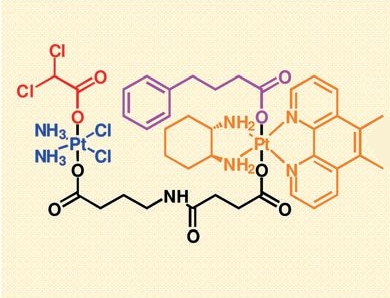Cisplatin, an anticancer drug, is widely used for chemotherapy. However, its usefulness is limited by the resistance that tumors develop to the drug. Overcoming this resistance is a major clinical challenge.
Dan Gibson, The Hebrew University of Jerusalem, Israel, and colleagues have prepared a dinuclear Pt(IV) “quadruple action” prodrug (pictured) designed to overcome resistance. Inside cancer cells, this prodrug releases four different bioactive moieties, each acting on different cellular targets, that combine synergistically to kill the cells. The prodrug was obtained by linking the Pt(IV) derivatives of cisplatin with dichloroacetate and [Pt(1S,2S-diaminocyclohexane)(5,6-dimethyl-1,10-phenanthroline)]2+ with phenylbutyrate.
The prodrug is extremely potent against a panel of cancer cells. It is 200–450 times more effective than cisplatin against pancreatic and colon KRAS mutated cells, a mutation that is the cause of most pancreatic and colon cancers. For more than three decades, attempts to find an inhibitor failed and, to date, KRAS had been considered “undruggable”. These quadruple-action prodrugs thus represent a major step in anticancer therapy.
- A Quadruple-Action Platinum(IV) Prodrug with Anticancer Activity Against KRAS Mutated Cancer Cell Lines,
Emanuele Petruzzella, Jeremy Phillip Braude, Janice R. Aldrich-Wright, Valentina Gandin, Dan Gibson,
Angew. Chem. Int. Ed. 2017.
DOI: 10.1002/anie.201706739




